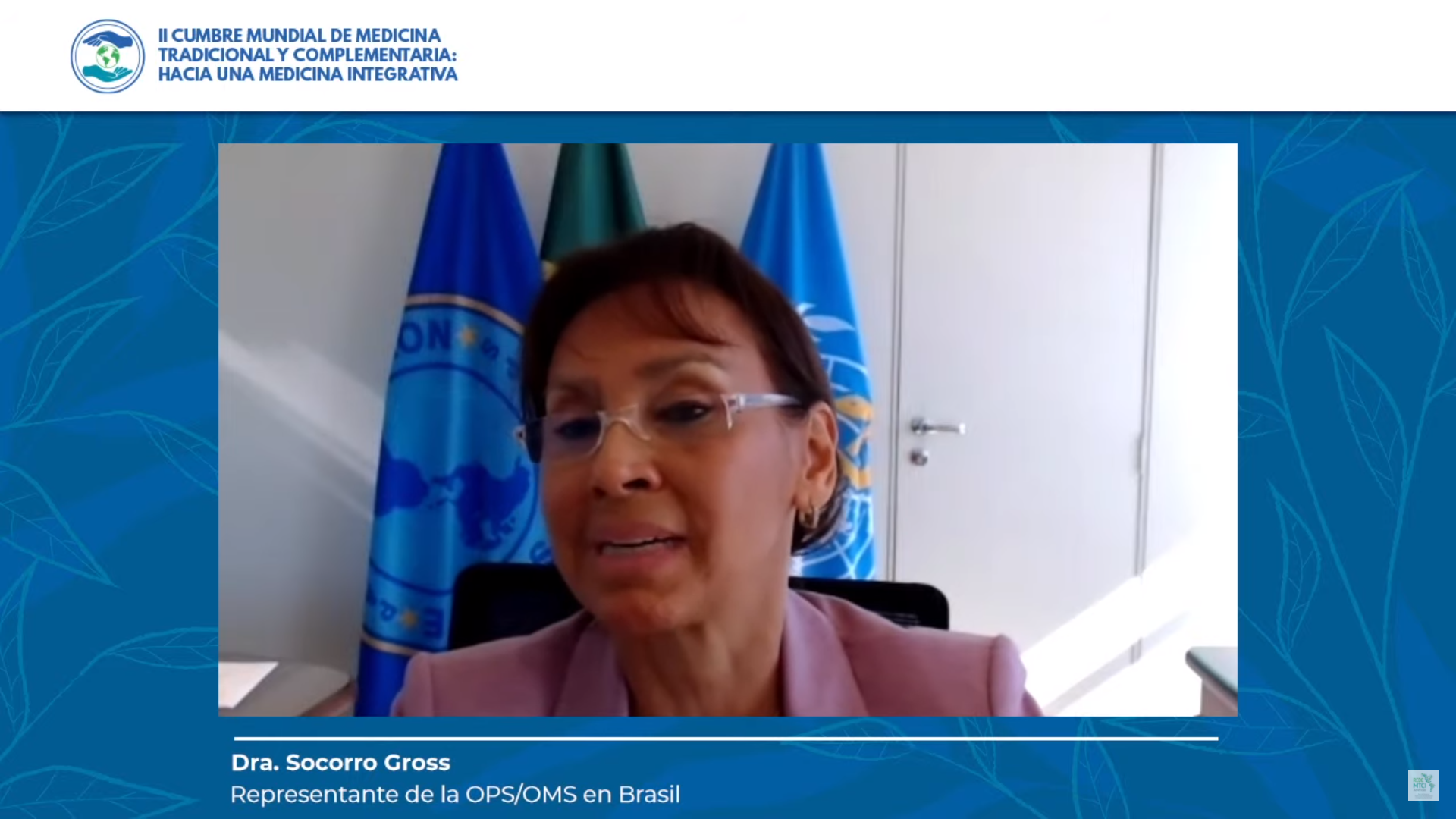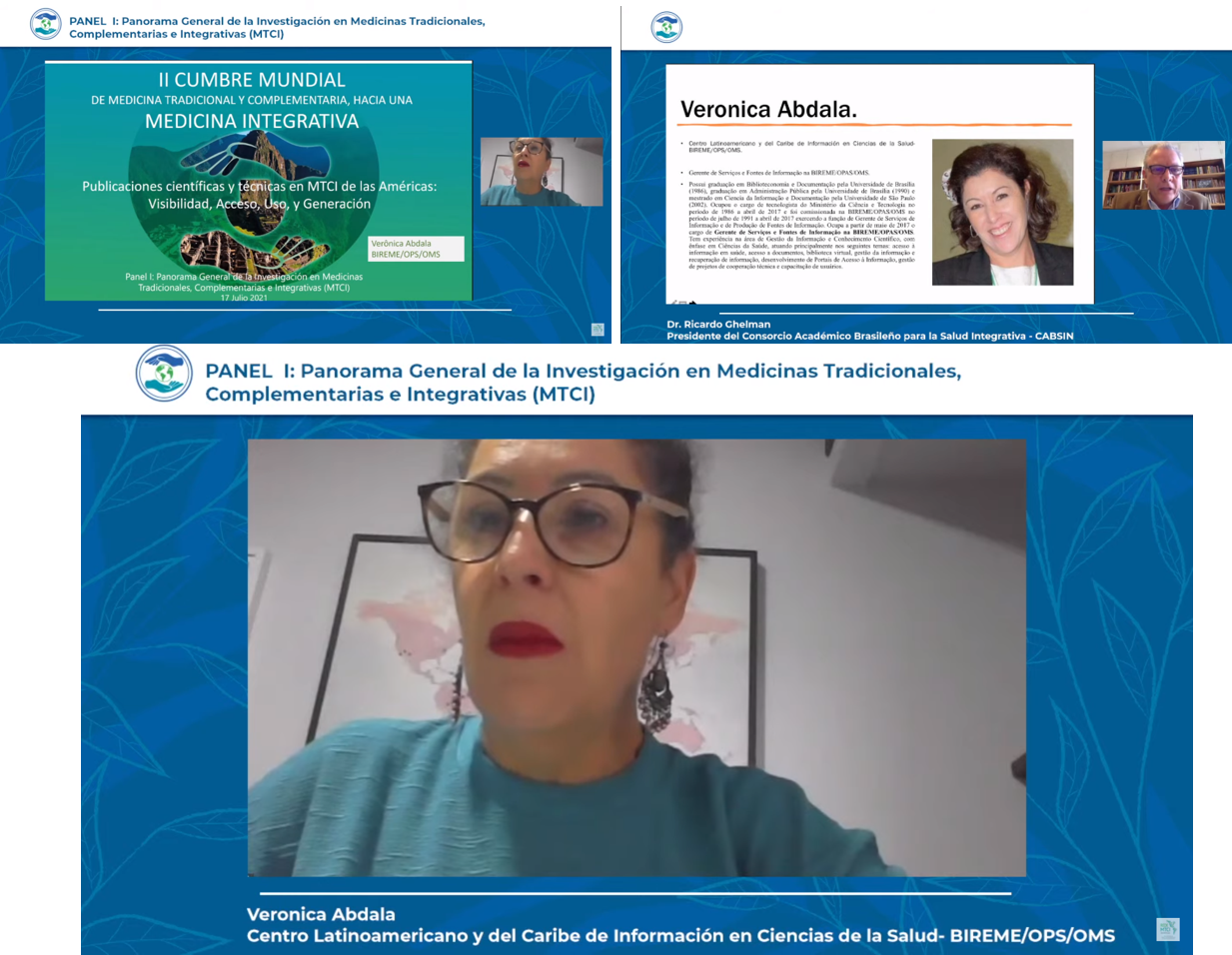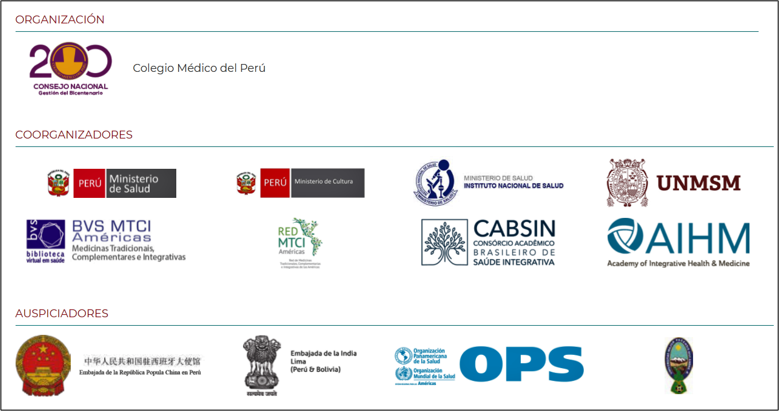The II World Summit of Traditional and Complementary Medicine: Towards an Integrative Medicine, held between July 16 and 25, was marked by the participation of more than 180 renowned speakers from 30 countries. With the aim of sharing relevant experiences, creating the possibility of knowing different realities of each region of the world, the event was organized by the Colegio Médico del Perú, through its Committee of Traditional, Alternative and Complementary Medicine, with the support of the Traditional, Complementary and Integrative Medicine Network, the Consórcio Acadêmico Brasileiro de Saúde Integrativa (CABSIN) and the Academy of Integrative Health & Medicine, in addition to the support of the Pan American Health Organization/World Health Organization (PAHO /WHO), through its Representation in Peru and with the presence of the Representatives of PAHO/WHO in Peru, Carlos Garzón and Brazil, Socorro Gross, as well as Ambassadors from several countries.
The event took place virtually over six days of activities, 60 hours of live streaming on two YouTube channels with simultaneous English/Spanish translation, resulting in more than 50,000 views.
The Keynote Lecture entitled “Traditional Medicine Strategy of the World Health Organization”, presented by Zhang Qi, Head of Complementary, Traditional and Integrative Medicine of the World Health Organization (WHO), provided a global vision of complementary and integrative traditional medicine and its future prospects in order to harmonize the integral development of TCIM in all countries.
The opening event featured interventions from various authorities. Here we highlight some of them.
The PAHO/WHO representative in Brazil, Socorro Gross, said: “this network of traditional, complementary and integrative medicine in the Americas is one of the fruits of the collaborative work of different countries, as the organization promotes this union between countries to promote actions that improve people’s lives. I would also like to highlight and congratulate the effort that Brazil has made, together with BIREME, with the TCIM Virtual Health Library and with the Consórcio Acadêmico Brasileiro de Saúde Integrativa, which has developed the evidence maps that give more visibility to the evidence relevant to traditional and integrative medicine. And that helps position integrative practices in our services and health systems, especially in primary health care and public policies in our countries.” The President of the TCIM Committee and the Organizing Committee, Martha Villar, who highlighted: “WHO, together with PAHO, in the 40 years of celebration of primary health care in its Declaration of Astana, affirms that success in primary health care will depend on the development of knowledge and skills using both scientific and traditional knowledge. In this context, and with the aim of generating a space to share knowledge from different parts of the world, is that the Medical College of Peru, through its Committee of Traditional, Complementary and Integrative Medicine is organizing this Summit. Always seeking the articulation of TCIM in health systems, in addition to rescuing the profound value that ancestral knowledge represents for the health of communities.”
The President of the TCIM Committee and the Organizing Committee, Martha Villar, who highlighted: “WHO, together with PAHO, in the 40 years of celebration of primary health care in its Declaration of Astana, affirms that success in primary health care will depend on the development of knowledge and skills using both scientific and traditional knowledge. In this context, and with the aim of generating a space to share knowledge from different parts of the world, is that the Medical College of Peru, through its Committee of Traditional, Complementary and Integrative Medicine is organizing this Summit. Always seeking the articulation of TCIM in health systems, in addition to rescuing the profound value that ancestral knowledge represents for the health of communities.”
According to Carlos Garzón, PAHO/WHO Representative in Peru, “traditional and complementary medicine is an important, and often underestimated, part of health care, which is practiced in all countries of the world, with a growing demand. Traditional medicine, of proven quality and efficacy, helps to ensure access for all people to achieve universal access to health.” To support this, PAHO has developed an interdisciplinary working group, as already discussed in previous presentations, which is composed of many units. However, I would like to highlight the Department of Health Services, the Gender Equity and Culture Unit and the Latin American and Caribbean Center for Health Sciences Information (BIREME). In addition, as has been mentioned, I would also like to highlight the Virtual Library in Health TCIM, which aims to facilitate access, visibility, use and generation of scientific, technical and educational content of great importance at this time”.
The II World Summit was also marked by conferences and debates related to the theme “Research and information management in TCIM”, which was discussed in Panel I on the overview of research in traditional, complementary and integrative medicines (TCIM). BIREME was then represented by its Manager of Services and Sources of Information, Verônica Abdala, who spoke on the topic: “Scientific and technical publications in TCIM in the Americas: visibility, access, use and creation”. Veronica also said that “all this work that we present today on behalf of the Americas TCIM Network began with a seed planted at a meeting in Nicaragua in June 2017, through the initiative of Socorro Gross, on that occasion the country’s PAHO/WHO Representative, who promoted the meeting ‘Advancing towards Universal Health, contributions of Traditional and Complementary Medicine’. It was on this occasion that I presented the proposal to build a VHL to promote, develop, identify, map and manage information within the topic of TCIM.” According to Natalia Sofia Aldana, executive secretary of the TCIM Americas Network, the II Summit fulfilled the objective of enabling the exchange of experiences of countries on how they have advanced in the articulation of TCIMs in their health systems and services, in academia, research and regulation, aligned with the WHO Traditional Medicine Strategy. In addition to that, and above all, the Summit enabled the meeting and knowledge exchange between teachers, researchers and ancestors who know indigenous communities, decision makers and collaborators and social actors on the subject. In the opinion of the speakers, the II Summit allowed us to observe that different actors are working with TCIMs to contribute to Universal Health, Equity, Primary Health Care and the intercultural approach to health services.
According to Natalia Sofia Aldana, executive secretary of the TCIM Americas Network, the II Summit fulfilled the objective of enabling the exchange of experiences of countries on how they have advanced in the articulation of TCIMs in their health systems and services, in academia, research and regulation, aligned with the WHO Traditional Medicine Strategy. In addition to that, and above all, the Summit enabled the meeting and knowledge exchange between teachers, researchers and ancestors who know indigenous communities, decision makers and collaborators and social actors on the subject. In the opinion of the speakers, the II Summit allowed us to observe that different actors are working with TCIMs to contribute to Universal Health, Equity, Primary Health Care and the intercultural approach to health services.
In his closing remarks, Hernán García Ramirez, Deputy Director of the Directorate of Traditional Medicine and Intercultural Development of Mexico, highlighted the central issues discussed at the Summit and the recommendations consolidated in the declaration that will inevitably become the roadmap to continue advancing in the articulation of TCIM. He mentioned the six axes that were made present every day in different panels and plenary conferences, where participants discussed public policies and regulations, research and management of information, recognition, protection, promotion, everything related to the management of health services, academic training, the generation of skills and the quality of resources, inputs and therapeutic products. Finally, Hernán ratified the commitment to support Member States in the recommendations included in the Summit declaration, also to strengthen and motivate them to continue using the scientific, technical and educational content available in the Virtual Health Library and sharing positive experiences in a World Virtual Library. He adds: “We adhere to the recommendations of the Declaration of this Second Summit to contribute to the integration and articulation of TCIM in global health systems and services, recommendations that are in harmony with the WHO Strategic Plan 2014-2023, as well as PAHO’s strategy and plan of action on Ethnicity and Health 2019-2025, fighting for people’s right to enjoy the highest level of health so that all people can be favored and equity, interculturality and quality are promoted to advance towards universal health.”
Videos available
Keynote address of the event, with the participation of the PAHO/WHO Representative in Brazil, Socorro Gross. Available in: https://www.youtube.com/watch?v=RzzHUbt_kII&t=145s
Participation of Verónica Abdala, Manager of Services and Sources of Information at BIREME. Available in: https://www.youtube.com/watch?v=jML4oa_3azQ
All the activities carried out during the Second World Summit are available at: https://www.youtube.com/channel/UCUBPlnqF2Jd73n26TVtUxqQ